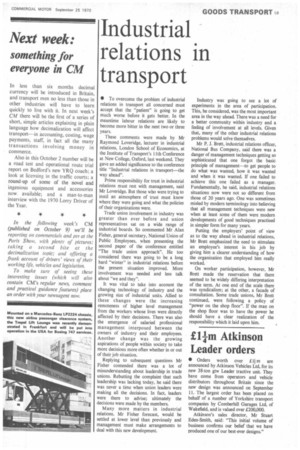Industrial relations in transport
Page 61

If you've noticed an error in this article please click here to report it so we can fix it.
• To overcome the problem of industrial relations in transport all concerned must accept that the "patient" is going to get much worse before it gets better. In the meantime labour relations are likely to become more bitter in the next two or three years.
These comments were made by Mr Raymond Loveridge, lecturer in industrial relations, London School of Economics, at the Institute of Transport's 11th Conference at New College, Oxford, last weekend. They gave an added significance to the conference title "Industrial relations in transport—the way ahead".
Prime responsibility for trust in industrial relations must rest with management, said Mr Loveridge. But those who were trying to instil an atmosphere of trust must know where they were going and what the policies of their organizations were.
Trade union involvement in industry was greater than ever before and union representatives sat on a wide range of industrial boards. So commented Mr Alan Fisher, general secretary, National Union of Public Employees, when presenting the second paper of the conference entitled "The trade union approach". He too considered there was going to be a long hard "winter" in industrial relations before the present situation improved. More involvement was needed and less talk about "we and they".
It was vital to take into account the changing technology of industry and the growing size of industrial units. Allied to these changes were the increasing remoteness of higher level management from the workers whose lives were directly affected by their decisions. There was also the emergence of salaried professional management interposed between the owners of industry and their employees. Another change was the growing aspirations of people within society to take more decisions more often whether in or out of their job situation.
Replying to subsequent questions Mr Fisher contended there was a lot of misunderstanding about leadership in trade unions. Rebutting the complaint that such leadership was lacking today, he said there was never a time when union leaders were making all the decisions. In fact, leaders were there to advise; ultimately the decisions were made by the members.
Many more matters in industrial relations, Mr Fisher forecast, would be settled at lower level than previously and management must make arrangements to deal with this new development. Industry was going to see a lot of experiments in the area of participation. This, he considered, was the most important area in the way ahead. There was a need for a better community within industry and a feeling of involvement at all levels. Given that, many of the other industrial relations problems would solve themselves.
Mr P. J. Brett, industrial relations officer, National Bus Company, said there was a danger of management techniques getting so sophisticated that one forgot the basic principle of management—to get people to do what was wanted, how it was wanted and when it was wanted. If one failed to achieve this one failed as a manager. Fundamentally, he said, industrial relations situations now were not so different from those of 20 years ago. One was sometimes misled by modern terminology into believing that all management tethniques were new when at least some of them were modem developments of good techniques practised in simpler form for many years.
Putting the employers' point of view as to the way ahead in industrial relations, Mr Brett emphasized the need to stimulate an employee's interest in his job by giving him a clearer understanding of how the organization that employed him really worked.
On worker participation, however, Mr Brett made the reservation that there seemed to be widely differing interpretation of the term. At one end of the scale there was syndicalism; at the other, a facade of consultation. Some trade unions, Mr Brett continued, were following a policy of "power on the shop floor". If the man on the shop floor was to have the power he should have a clear realization of the responsibility which it laid upon him.


























































































































































































